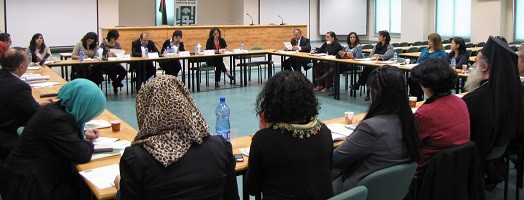The Status of Women in Ecclesiastical Courts
Academics, representatives of interest groups, women’s rights activists, and feminists took part in the workshop.
The workshop highlighted conclusions of a survey developed by the Kayan Feminist Organisation on the Status of Women in Ecclesiastical Courts. Comprising field and statistical components, the survey provides a research-oriented, critical reading of ecclesiastical court functions from a gender perspective. In addition to future trends, the survey addresses key activities and developments introduced to ecclesiastical courts and personal status legislation in the West Bank, Jerusalem, Israel, and Jordan.
Having welcomed the speakers and audience, IoL Director Dr. Jamil Salem highlighted significance of the workshop. Developments introduced to Christians’ personal status matters would favourably reflect on and enhance relevant laws and court proceedings. this issue is controversial as most provisions of personal status laws derive from religion. A discussion of personal status cases should be objective and grounded in applied, logical arguments of provisions of personal status laws. In this context, amendments introduced to personal status laws do not necessarily imply a rejection of religion.
Ms. Rafah Anabtawi, Manager of the Kayan Feminist Organisation, explained that the workshop was important because it “highlights key issues and discussions of personal status laws.” These include enhancement of the legal status of women, documentation of violations against women, consequences of violence on women, and development of a programme that changes the current legal context to better reflect on women.
The workshop comprised one session, which was moderated by Ms. Arine al Hawwari, a feminist and postgraduate student in gender studies. Ms. Hawwari stated that feminists inside the Green Line “have sought to amend effective personal status laws. According to a 2004 amendment, women now have the option to initiate personal status cases before religious or civil courts. Marriage and divorce cases are excluded from the amendment.”
Ms. Rawan Ighbariyyeh, a lawyer at the Legal Department of Kayan Feminist Organisation, addressed the role the Kayan Legal Department plays in raising women’s awareness of their right. “The Legal Department offers legal advice, represents women before ecclesiastical and sharia courts, and casts light on social, cultural and legal challenges which women face inside the Green Line.”
Counsel Ya’qoub al Far went over his experience in arguing personal status cases in ecclesiastical courts of Jordan. Christian families are negatively affected by current personal status laws. Each Christian community is subject to a law that is different from other denominations. To provide guarantees and administer justice to litigants, Christian institutions and clergymen have sought to amend personal status legislation. According to amendment of Article 109 of the Jordanian Constitution, councils of non-Muslim religious communities can now implement relevant laws. Counsel Al Far also made a briefing note about ecclesiastical courts, including jurisdiction, decisions, objection mechanisms, appointment of judges, and relevant problems.
Counsel Nabil Mushahwar, former Chairman of the Palestinian Bar Association, addressed personal status matters of Christian denominations in ecclesiastical courts of the West Bank and Jerusalem. These include divorce, separation, invalid marriage, obedience, alimony, etc. Counsel Mushahwar explained the status of litigants in Jerusalem who resort to the Israeli Family Court. He stressed that a new personal status law should be enacted to regulate court proceedings. Judges should also enjoy a legal culture.
Ms. Alhan Nahhas, a former lawyer at Kayan and counsel at ecclesiastical courts inside the Green Line, provided an overview of developments introduced to personal status laws in Israel. With the exception of marriage and divorce cases, Arab women have been empowered to appear before civil courts to process personal status matters. Ms. Nahhas highlighted problems associated with absent oversight of ecclesiastical courts in Israel. Only the Israeli High Court of Justice intervenes in the event a court violates relevant jurisdictions. Ecclesiastical court decisions are not published. In addition to exorbitant fees, women have limited access to choose a preferred divorce procedure. Enforcement of court decisions is procrastinated. Divorce procedures are not transparent, negatively impacting on women.
In his comment, His Eminence Archbishop Atallah Hanna stated the women should be more visible in ecclesiastical courts. Similar meetings should be organised to make voice of women heard. Women play a central role in national institutions as well as in sharia and ecclesiastical courts.
In the ensuing discussion, participants highlighted that the Legislature should intervene to regulate these sensitive issues of far-reaching impact. Similar workshops should be organised with participation of influential actors in the society. To devise solutions, problems that impede the Palestinian society will be raised for discussion. A public debate will take account of the status of women and family in light of contemporary developments and teachings of monotheistic religions. Of particular note, cooperation and coordination will be in place between academic institutions and civil society organisations. Current experience will be built on by a continued, concerted effort between Palestinian institutions, including inside the Green Line.
Dr. Salem expressed his thanks to Ms. Anabtawi, Manager of the Kayan Feminist Organisation, and audience who participated in the workshop. He also commended participants’ contribution to raising discussion on many issues relating to the status of women in ecclesiastical courts and personal status laws. These bear on the Palestinian society from across the spectrum.
Speakers
1. Jamil Salem, IoL Director
2. Rafah Anabtawi, Manager of the Kayan Feminist Organisation
3. Arine al Hawwari, a feminist and postgraduate student in gender studies
4. Rawan Ighbariyyeh, lawyer at the Legal Department of Kayan Feminist Organisation
5. Ya’qoub al Far, counsel at ecclesiastical courts in Jordan
6. Nabil Mushahwar, counsel at ecclesiastical courts in the West Bank and Jerusalem and former Chairman of the Palestinian Bar Association
7. Alhan Nahhas, former lawyer at Kayan Feminist Organisation and counsel at ecclesiastical courts inside the Green Line
Venue
The Institute of Law at Birzeit University
Date
2014-04-15






